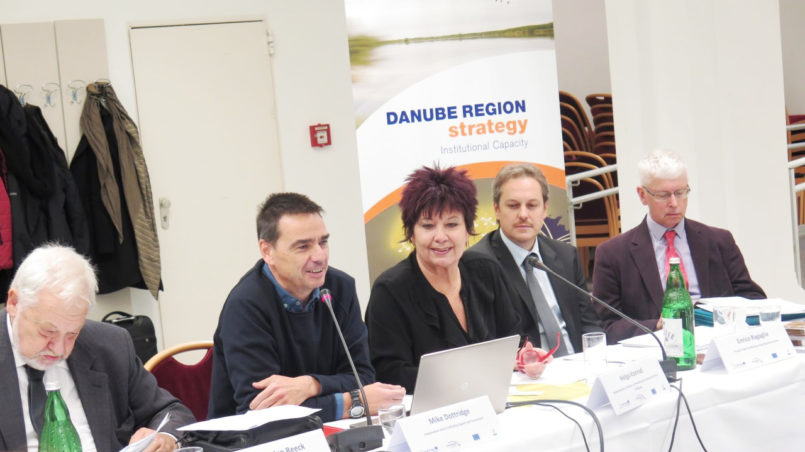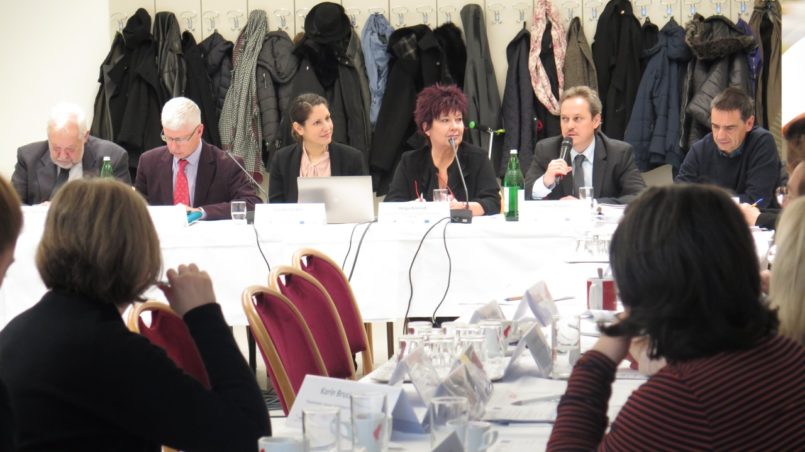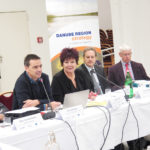Human Trafficking also Exists in Europe

Event data
- Datum
- 24. 11. 2017
- Host
- EUSDR Priority Area 10 "Institutional Capacity and Cooperation" & Regional Implementation Initiative on Preventing and Combating Human Trafficking
- Location
- Rathaus, Vienna
- Event-type
- Round Table
- Participants
- Helga Konrad, Director of Regional Implementation Initiative on Preventing&Combating Human Trafficking
- Enrico Ragaglia, Project Manager Anti-Trafficking Programme, ICMPD
- Mike Dottridge, Independant Anti-Trafficking Expert and Consultant
- Stefano Volpicelli, Trainer and Researcher on Migration and Trafficking in Human Beings
- Evelyn Probst, Coordinator of LEFÖ-ibf Intervention Centre for Trafficked Women and Girls, Austria
- Marc Van den Reeck, NGO "The Smile of the Child"
- Shams Asadi, Head of Office for Human Rights, Vienna
Under the title “Danube Cities against Human Trafficking”, a round table was organised on 24 November 2017 in the Vienna City Hall, focusing on combating and preventing human trafficking in Europe at a local level. The event was intended to facilitate the future coordination and cooperation between the institutions present. At the same time, awareness of this topic should also be promoted in society.
According to Helga Konrad, head of the Regional Implementation Initiative against Trafficking in Human Beings for the Institute for the Danube Region and Central Europe (IDM), the so-called migration and refugee crisis is currently employing the majority of people in Europe to such an extent that problems such as trafficking in human beings are simply being forgotten. Trafficking in human beings is the exploitation of helpless people in personal and economic hardship by criminal networks.
At the moment, there are still too many governments and authorities which believe that they do not have to do anything about human trafficking – on the grounds that it is “only” about migrants who are affected by it, says Marc Van den Reeck of the non-governmental organisation The Smile of the Child. Incidents of human trafficking have already occurred throughout Europe. This is a much larger issue than the assumption that only migrants are affected. In his opinion, 80-85% of the victims of human trafficking are not migrants from Africa or the Middle East, but citizens from other European countries. There is inevitably a link between human trafficking and the so-called refugee or migration crisis but, according to Van den Reeck, the problem goes beyond this crisis.
In his presentation, Mike Dottridge, an independent expert and anti-trafficking advisor, cited the most common activities in which the victims of human trafficking people are later “employed”. From Dottridge’s point of view, the main activities are catering (restaurants and hotels), agriculture, building sites, forced begging, the cultivation and sale of cannabis and prostitution. Trafficked people are forced into precarious employment relationships and, as a result, become dependent on criminals.
According to Volpicelli, even though those affected are subject to legal proceedings, they receive neither economic nor moral compensation for their collaboration with the judiciary. Apparently, this fact applies everywhere. Instead, the victims are often even regarded as accomplices to a crime in court proceedings.
According to Evelyn Probst, coordinator of the intervention agency for victims of trafficking in women, there is currently no legal proceeding concerning the treatment of victims of human trafficking, especially with regard to the legal situation in Austria. As a result, those affected have no rights if they are victims of human trafficking. On 1 January 2018, at the provincial level, a new law should come into force in Vienna which would grant victims of human trafficking the right to a trial. However, according to Probst, there is a danger that the new turquoise-blue government will repeal this law.
In addition to granting rights for victims of human trafficking at the legal level and an assumption of responsibility by governments, coordination and cooperation at the local level is particularly important, says Dottridge. Important factors here are the identification of situations in which people are trafficked and the earliest possible intervention.
In order to encourage states to focus their attention on this problem, it is necessary to convince authorities capable of intervening in the trafficking of both adults and children. According to Van den Reeck, Europol’s announcement last year that 10,000 children are officially considered missing in Europe should make the problem of trafficking in adults and children in Europe clear to the state authorities. But from their point of view, however, state security, rather than human security, is still the first priority.
Van den Reeck stated that, in order to raise public awareness of the tragic reality of human trafficking, the media in particular could play an important role by highlighting this reality and encouraging action, while the individual should address it as a topic within his/her circle of acquaintances.
The existence of human trafficking within an “advanced” society could be seen as a backward trend. Or isn’t it rather a realization of a problem that has been overlooked up to now?
Translation German-English: Anna Dichen



